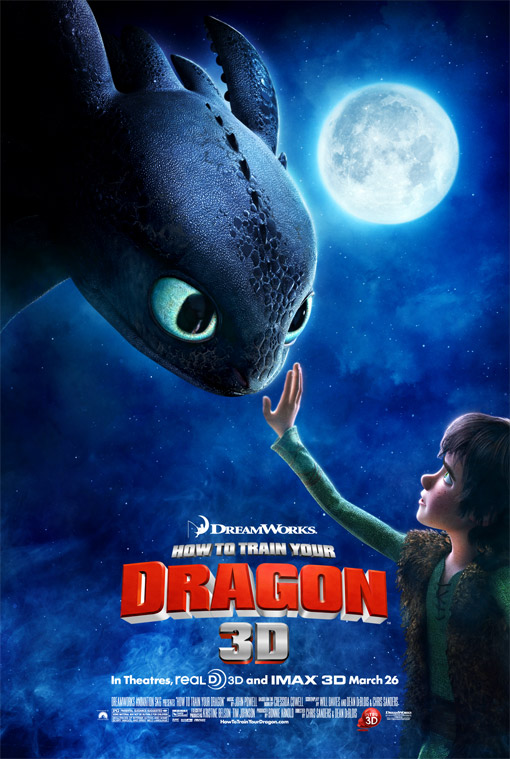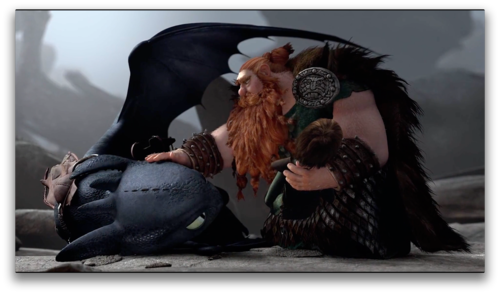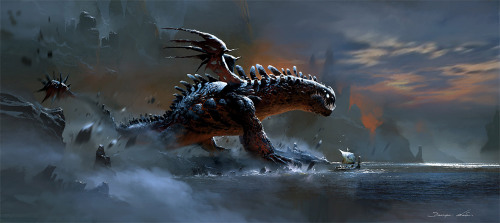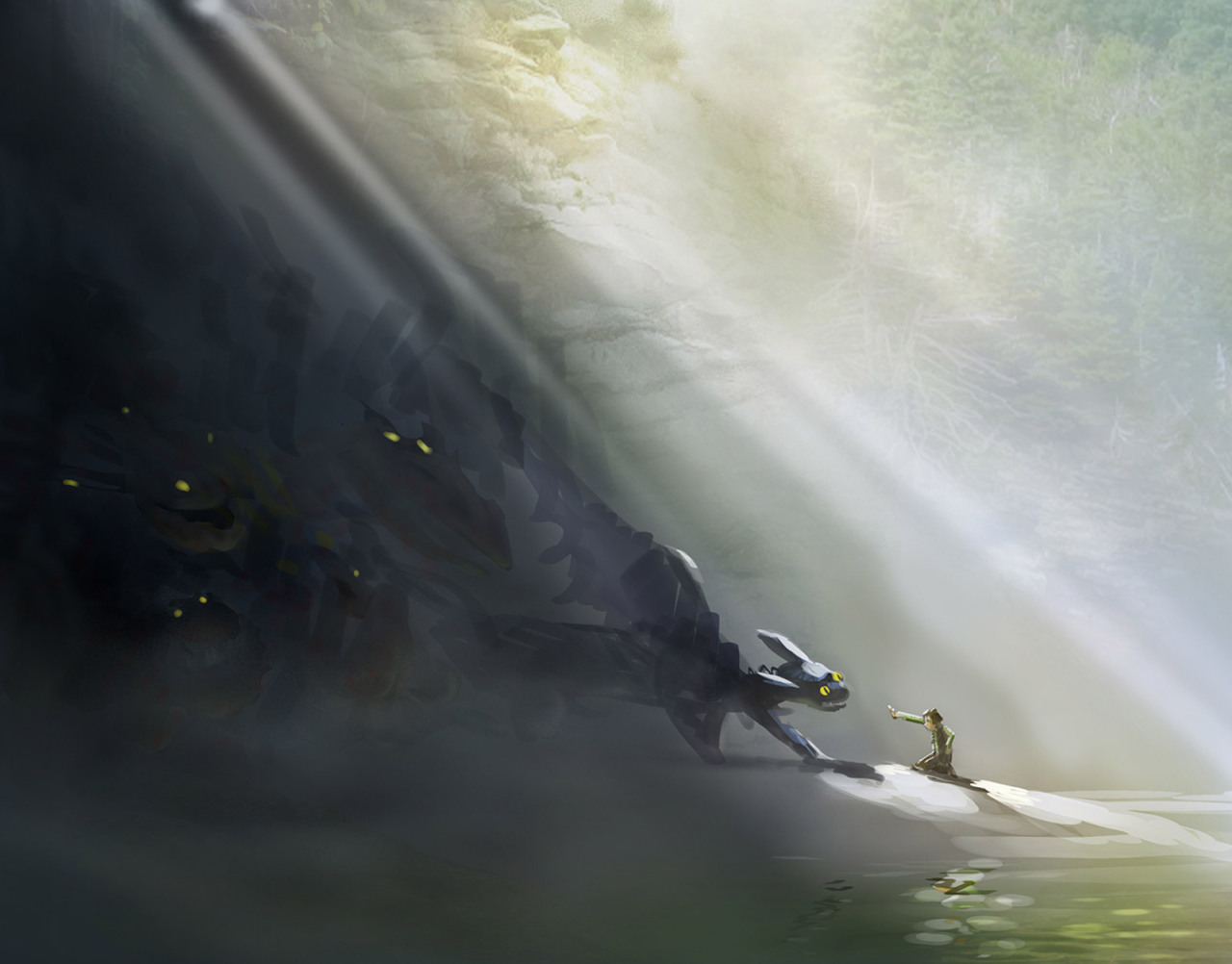"That's My Favourite Movie!": How to Train Your Dragon
By Andrew Braid
Directed by Chris Sanders and Dean DeBlois
Screenplay by Will Davies, Dean DeBlois and Chris Sanders
Starring: Jay Baruchel, Gerard Butler, Craig Ferguson, America Ferrera, Jonah Hill, Christopher Mintz-Plasse, T.J. Miller, Kristen Wiig
Release Date: March 26, 2010
Hi everyone, and welcome to the first in a planned recurring series of columns called "That's My Favourite Movie!". As for what it's about, well, judging from the title you can probably guess: in each entry I (or a guest writer) will talk about one of their favourite movies. What that talk entails exactly can be all sorts of things, be it one's favourite scenes, characters or elements of the film, memories of your experiences with the movie (be it the first, second, fifth or fiftieth viewing), personal interpretations of the film, and maybe even interesting behind-the-scenes facts. But the main reason for this series is to express why you love the movie in question: why it sticks with you, why you find yourself returning to it time and again, what it means to you. It may get bloated, it may even get kinda messy and scattered, but it's definitely going to be honest.
With the release of the much-anticipated sequel upon us, I thought it'd be a great time to look back at the widely-beloved original film, and one of my personal favourite films: How to Train Your Dragon.
 |
| "Sorry, he's still a little bitter about losing to Toy Story 3..." |
Anyone who knows me would know very well that I'm a big animation buff. There's just so much the medium is capable of, so many things it can pull off that live-action just can't do, and it always irritates and disappoints me that there's still many people out there who see the medium as merely low-rent junk made for kids. If I had to give a list of my Top 5 Favourite Animated Films of all time, it would most certainly be a difficult undertaking- I'd want to represent a variety of styles and studios, to make something that's personal yet also captures the diversity of the medium. For Pixar I would undoubtedly choose Up, an emotional and thrilling journey about age and discovery that stands as the studio's funniest and most mature film to date. Picking just one film from Disney Animation is immensely difficult, though if we're throwing childhood nostalgia into the mix then I'd probably choose the best of the 90s Disney Renaissance features, Beauty and the Beast (other contenders include Bambi, Fantasia and The Lion King). Choosing a film from Japanese animation giant Studio Ghibli is an even greater challenge, as I still haven't figured out exactly which Hayao Miyazaki film is my absolute favourite (I'd say it's a three-way tossup between Spirited Away, Princess Mononoke and Porco Rosso). From Warner Bros. Animation comes the cult classic The Iron Giant, aka the only movie that can ever make me full-on cry- basically it's the cooler, funnier, all-around better version of E.T. (if I had to make a #1 pick, it would likely have to be this one).
And then there's the last movie on that Top 5 list: DreamWorks Animation's How to Train Your Dragon. DreamWorks is an animation studio that's gotten a lot of flack over the years, most of which isn't really deserved (emphasis on "most"- I still haven't forgotten Shark Tale, Shrek the Third or Turbo...). They're essentially to Disney and Pixar now what Warner Bros. and the Looney Tunes were to Disney back in the golden age (from the 1930s to the end of the 50s): the image of the cooler, funnier, more "hip"alternative to the squeaky-clean family image that Disney's always been clinging to (DreamWorks also shares the old Warner Bros. tradition of slipping in more "adult" jokes into many of their movies). This has gotten them a lot of commercial and audience love, but not much in terms of respect. They didn't start gaining a better image in the film community and critics' circles until 2008's Kung Fu Panda, which signalled a shift both in DreamWorks' approach to making movies and their own sense of identity as an animation studio. Rather than making mostly mass-appealing comedies (though they do still make those, albeit with generally more quality nowadays), the studio instead turned its focus to putting their own spins on various genre fare: the Kung Fu Panda films are directly influenced by classic Hong Kong martial arts cinema, Monsters Vs. Aliens pays homage to 1950s monster movies, Megamind deconstructs the formula of comic book superhero stories, and Rise of the Guardians is rooted in cultural legends and folklore.
How to Train Your Dragon changed everything for DreamWorks. Eschewing the primary focus on comedy that's common with the studio's other films (though it certainly has plenty of great humour throughout), Dragon is namely a fantasy-adventure film at heart, a soaring and altogether thrilling tale about a young teenage viking and the wounded creature he befriends. Unlike any other DreamWorks movie before it or since, this film would live or die based on its story alone, and the exemplary amount of care put into telling the tale of Hiccup and Toothless proved to many just what the studio was really capable of when they fire on all cylinders.
Not that the story is very original- in fact, nearly all the elements there are quite familiar. We have the tried-and-true "a boy and his dog/pet/alien/robot/magical friend" narrative at the film's core, mixed with a strained father/son relationship, a message about overcoming prejudice and even some bits of budding young romance (though Dragon's Astrid is considerably more badass and better characterized than so many other female characters who become crushes/love interests for the hero). However I firmly believe that originality, while still valuable and absolutely welcome (especially in an industry littered with remakes, sequels and adaptations), isn't really a necessity. It's so difficult to be truly original in storytelling because most stories boil down to a lot of elements that, like it or not, have undoubtedly been done before in some shape or form. What matters most in storytelling is the quality and execution, not whether a story is really "original" or not. And How to Train Your Dragon is an absolutely perfect example of this: you know in the back of your mind that you've seen this story before, but it's told in such an exciting, confident, emotional and visually breathtaking way that you honestly find no reason to care. It's a film that takes a well-worn narrative and makes it feel fresh and engaging no matter how many times I see it (and believe me, I've seen this movie a LOT of times).
The first time I saw How to Train Your Dragon was in theatres, on a discount Tuesday about a week and a half after it opened. I initially intended to see it on its opening weekend, but I was strapped for cash at the time and had a good deal of assignments to take care of at the tail end of my first year in university. Initial trailers I remember looking decent but not exactly remarkable, though the final trailer that was released just a few weeks before release actually sold the movie pretty well (and ended up being a more accurate representation of the final film- you can see it here). I had heard all the fantastic reviews and buzz about it that was beginning to swell, and was interested to see what the movie was really like. I wasn't exactly a big fan of DreamWorks Animation at the time- aside from the first two Shrek movies and Kung Fu Panda, I mostly just liked and enjoyed their output without really loving it. Little did I know that How to Train Your Dragon would turn me around on that.
The second time I saw the movie was a couple weeks later, on a Saturday afternoon while I was visiting around Toronto. This time I got to see the movie in IMAX 3D. I had already been surprised and exhilarated by my first viewing, and was anxious to see it again while it was still in IMAX (Iron Man 2 would be taking those screens the following week). Needless to say this was the best I ever experienced the movie, and the viewing that effectively wowed me on a whole other level. All the scale, all the incredible flight sequences, the immersive and awe-inspiring 3D (still among the best I've ever seen), all of it felt that much bigger to the point where it practically transported you into the film's world. There was a solid-sized crowd in attendance for that showing, and it was wholly palpable just how collectively engaged and thrilled everyone was by what they were experiencing- everyone actually stood up and applauded when the end credits started. For that to happen at, say, a film festival premiere or maybe a very excited (and fanbase-heavy) advance screening is one thing- those tend to be played up as big events, ones where the audience is pumped for the movie ahead of time and applause or cheering is often expected (or at least desired). But this was just an everyday Saturday afternoon screening of a film that had already been widely playing for five weeks. This sort of thing never happens when I go to see movies.
This experience is emblematic of the effect that How to Train Your Dragon has on people, the energy, charm and sense of wonder that turns many (myself included) into obsessed and excitable fanboys/girls. Every element of this film is executed in an exceptional and wholly engaging manner: the story, the characters, the animation, the music, the action, the humour, the pacing... the list could very well go on. The amazing 3D certainly helped too, immersing the viewer into the film's world and even enhancing the visual storytelling- seeing Hiccup's hand subtly poke out in 3D as it reaches for Toothless really makes one feel all the more like they're seeing it from the dragon's perspective. And the flying sequences? A whole other level of breathtaking.
The first time I saw How to Train Your Dragon was in theatres, on a discount Tuesday about a week and a half after it opened. I initially intended to see it on its opening weekend, but I was strapped for cash at the time and had a good deal of assignments to take care of at the tail end of my first year in university. Initial trailers I remember looking decent but not exactly remarkable, though the final trailer that was released just a few weeks before release actually sold the movie pretty well (and ended up being a more accurate representation of the final film- you can see it here). I had heard all the fantastic reviews and buzz about it that was beginning to swell, and was interested to see what the movie was really like. I wasn't exactly a big fan of DreamWorks Animation at the time- aside from the first two Shrek movies and Kung Fu Panda, I mostly just liked and enjoyed their output without really loving it. Little did I know that How to Train Your Dragon would turn me around on that.
The second time I saw the movie was a couple weeks later, on a Saturday afternoon while I was visiting around Toronto. This time I got to see the movie in IMAX 3D. I had already been surprised and exhilarated by my first viewing, and was anxious to see it again while it was still in IMAX (Iron Man 2 would be taking those screens the following week). Needless to say this was the best I ever experienced the movie, and the viewing that effectively wowed me on a whole other level. All the scale, all the incredible flight sequences, the immersive and awe-inspiring 3D (still among the best I've ever seen), all of it felt that much bigger to the point where it practically transported you into the film's world. There was a solid-sized crowd in attendance for that showing, and it was wholly palpable just how collectively engaged and thrilled everyone was by what they were experiencing- everyone actually stood up and applauded when the end credits started. For that to happen at, say, a film festival premiere or maybe a very excited (and fanbase-heavy) advance screening is one thing- those tend to be played up as big events, ones where the audience is pumped for the movie ahead of time and applause or cheering is often expected (or at least desired). But this was just an everyday Saturday afternoon screening of a film that had already been widely playing for five weeks. This sort of thing never happens when I go to see movies.
This experience is emblematic of the effect that How to Train Your Dragon has on people, the energy, charm and sense of wonder that turns many (myself included) into obsessed and excitable fanboys/girls. Every element of this film is executed in an exceptional and wholly engaging manner: the story, the characters, the animation, the music, the action, the humour, the pacing... the list could very well go on. The amazing 3D certainly helped too, immersing the viewer into the film's world and even enhancing the visual storytelling- seeing Hiccup's hand subtly poke out in 3D as it reaches for Toothless really makes one feel all the more like they're seeing it from the dragon's perspective. And the flying sequences? A whole other level of breathtaking.
 |
| Pictured: The kind of movie moment that goes beyond merely memorable... |
The cast is filled with lovable characters, be they the feisty and competitive Astrid (America Ferrera), the nerdy stats-obsessed Fishlegs (Christopher Mintz-Plasse) or the eccentric peg-legged mentor and blacksmith Gobber (Craig Ferguson), who teaches the viking teens in their dragon training. However, they mostly remain explicitly side characters, allowing the film to keep things focused squarely on its core story about Hiccup and Toothless. Hiccup is a fantastic protagonist character, a gangly kid who simply doesn't fit in, wanting to prove his worth to a father and a village who doesn't really think the same way he does. Hiccup's also got a real passion for exploring, building and invention, which unfortunately doesn't seem to have much use to battle-obsessed vikings. He's braver than he knows and has a good-natured, compassionate soul (even if it's mixed with a healthy does of the sardonic and sarcastic). Jay Baruchel's distinctive nasally voice almost seems like a terrible idea on paper (and sure, I can see why some people may find it kind of annoying), it ends up fitting the character perfectly. Any more generic teen-sounding actor would have just made the character sound like some bland typical hero archetype, which isn't what Hiccup is at all- he's a builder and a misfit, a unique voice among a society that doesn't really accommodate uniqueness. The fact that he stands out is crucial to his character, particularly in how it plays into his friendship with Toothless. Toothless is as much a distinct character in his own right, proving he's more than just some mindless beast without ever saying a word. He can shift from fearsome and intimidating to cuddly and adorable on a dime in a manner all his own, quickly becoming the kind of animal companion anyone might wish they had. He's a true reflection of Hiccup, driven by curiosity and his own particular attitude (he's definitely smarter than your average dragon). He's a soul that feels trapped and alone, one who never quite fits in with the rest of his kind, not surprising seeing how he's a very rare species who's possibly the last of his kind. As they become friends Hiccup and Toothless awaken in one another a sense of just what they're really capable of, and the amazing things they can accomplish.
The ending scene where Hiccup wakes up to find he's lost his leg is a scene that catches many by surprise, and not just because it's the sort of dark, emotionally somber note of lingering consequences that's completely unexpected from an animated film aimed at families. It also completes the arc of Hiccup and Toothless' friendship in a powerful (and almost entirely visual-driven) way. As we see Toothless' tail sweep by the frame while he helps Hiccup walk, it becomes clear how the two are forever bonded now, not only wanting but needing each other's support to feel truly whole. They're both virtuous and capable of much on their own, but only together as one can they truly soar.
While Jay Baruchel's Hiccup is the heart and soul of How to Train Your Dragon, the best performance of the movie belongs to Gerard Butler as Hiccup's chieftain father Stoick the Vast. Rather than making the character some cartoonish villain (which would have been incredibly easy to do, and absolutely would have happened in the hands of lesser filmmakers), Stoick feels like a truly human and identifiable character who is merely doing what he has been raised like so many other generations of vikings to do: kill dragons. He struggles to raise his son and deal with the trouble he often causes for him and the village, wanting to be proud of him but finding himself unable to really stand up for or connect with a son who's just different from everyone else and will never be like other vikings even as Hiccup tries to win approval. Butler gives a performance here well beyond much of his mostly one-dimensional live-action output (though that's more the fault of the kinds of thinly characterized action hero roles he's often given), commanding and stubborn yet also rife with underlying insecurities and uncertainty. This is best shown in his scenes with Gobber, his best friend and confidante, where we see how he loves and cares for his son despite his frustrations, but he just feels lost as what to do with him. When Stoick does the whole "you're not my son" moment, it's different from all the over-exaggerated versions of this same scene that have been done before because we know it absolutely kills him inside to say such a thing. The look he gives after slamming that door isn't one of blind, prejudice-driven anger, but one of genuine heartbreak. It's written all over his face what the one thought in his head is right now: "what have I done?"
If DreamWorks has proven their mettle in competition with Disney/Pixar in any area, it's undoubtedly in the animation itself. They've made several fantastic-looking movies since they started out 20 years ago, but How to Train Your Dragon set a whole new gold standard, one which has kept encouraging their animators to up their game ever since. The level of detail is still astounding, whether it be all the hairs of Stoick's beard, Toothless' many black scales, or the etchings in Hiccup's notebooks. The true masterstroke however was hiring legendary cinematographer (and regular Coen Brothers collaborator) Roger Deakins to act as a visual consultant for the film. Having previously consulted on Pixar's Wall-E, Deakins' contribution here lends the film something that many animated films lack: a cinematic sense of lighting. It's easy to make an animated film bright and colourful and oh-so-marketably cartoony. But the use of lighting can make a huge difference in how immersive and eye-catching your movie can be, giving animation more of a live-action look and feel (thus lending an extra little "wow" factor when the story centres around fantastical creatures like dragons). It particularly adds to the film's environments, to the point where they look almost photorealistic: the shimmering waters of the ocean, the mossy pit where Hiccup and Toothless get to know one another, the tall cliffs protruding around the island of Berk during the first test flight. Even in smaller moments the lighting adds immensely, whether we see sunlight on Astrid as she sharpens her axe or the light of a lantern as Hiccup flips through the Book of Dragons. Since then the studio has regularly hired live-action cinematographers as visual consultants for their projects, and Deakins has consulted on several other DreamWorks films, such as Rise of the Guardians, The Croods, and of course How to Train Your Dragon 2.
If Deakins' and the animators provide the dazzle and awe, then composer John Powell offers the emotional sweep of the film with one of the best orchestral scores in recent memory. Imbued with a heavy Celtic influence and using instruments like the fiddle, bagpipes, penny whistle and harpsichord, the music created for Dragon perfectly reflects the emotion and action of every scene. Just listening to the score is like watching the film in my head, captivating even without the visuals to accompany it. Whereas most film scores have a bunch of filler to keep you busy while you wait for the few memorable good tracks, Powell's score for Dragon has no such filler: it's the kind of soundtrack you listen to from beginning to end. Not that there aren't a few particular standouts, with the pick for the best often being a three-horse (or dragon) race between "Forbidden Friendship", "Test Flight" and "Romantic Flight". The score was widely praised by many upon the film's release (it even got an Oscar nomination!), and remains a beautiful, captivating listen.
For what feels like the longest time I've had trouble really figuring out and articulating just what it is about How to Train Your Dragon that continues to stick with me, what made me fall so unabashedly in love with this movie to a degree that not many others have reached. I know there are objectively better movies out there- heck, there were even a few objectively better movies back in 2010 when Dragon came out (I still hold firm that the best film that year was The Social Network, and I definitely hold firm that it should have won the Best Picture Oscar instead of The King's Speech). But something always stood out about Dragon, and I think I know what it is now: it makes you feel. Every emotion the characters feel, every sight and expression of awe or wonder feels honest, palpable and wholly genuine. It's the very thing that film can be best at, and Dragon doesn't pad or waste a second of running time in its drive to unfold a captivating and immensely heartfelt narrative. On the darkest days, when all that seems to be left of the medium is mindless, shallow or soulless rehashes and product, How to Train Your Dragon is the kind of film that reminds me of my passion and devotion to an amazing, powerful and wondrous art form.
It makes me say "this is why I love the movies".
Thanks for reading through all my gushing and rambling, everyone! Have a great Canada Day/Independence Day holiday!
It makes me say "this is why I love the movies".
Thanks for reading through all my gushing and rambling, everyone! Have a great Canada Day/Independence Day holiday!






No comments:
Post a Comment